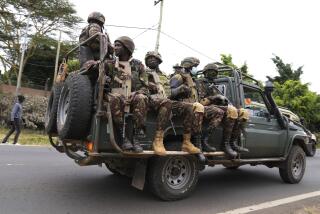Greece passes new spending cuts amid protests
- Share via
ATHENS — As tens of thousands of protesters shouting “Resist!” swarmed the streets outside, Greece’s Parliament on Wednesday narrowly approved its toughest batch of spending cuts yet in order to secure vital bailout funding from its European peers.
The legislation, including a controversial slate of fiscal and structural measures intended to save the state about $17 billion and ward off a messy financial collapse, was backed by 153 lawmakers of the 300-seat Parliament. Voting no were 128 lawmakers, including three from the conservative and leftist parties supporting the ruling coalition government.
“Yes,” Prime Minister Antonis Samaras told Parliament, “some of these spending cuts are unfair.”
But, he added, punching the air emphatically with his index finger, “they will be the last.... [They] will reverse the economy’s free-fall.”
Passage of the bill shifts focus to Sunday’s budget vote, a second hurdle Athens must clear to clinch a $39-billion package of rescue loans from its European peers and the International Monetary Fund.
Without the cash injection, the country would run out of funds in another week to pay for pensions, salaries and state expenses, according to Samaras.
The measures include tax hikes, pension and salary cuts of up to 15%, a two-year extension of the retirement age to 67, layoffs and elimination of holiday bonuses. It is the fourth batch of belt-tightening measures since the financial crisis here erupted in late 2009. And while most Greeks initially seemed willing to share in the painful cutbacks, growing numbers say bankrupt businesses and rampant unemployment are leaving people without hope.
“It’s not just the pain and financial inconvenience that these measures will spell,” said Evangelos Mittaras, a 57-year-old striking shoemaker. “It’s that there is no evidence that the policy of austerity is working.”
Indeed, as lawmakers crossed political swords and debate raged in the inner sanctums of Parliament for hours, 70,000 crisis-hit Greeks protested outside and millions of workers stayed away from their jobs in a second day of a strike that kept schools closed, road, rail and air services suspended and hospitals operating on emergency staff. Flights to and from the country were stopped for three hours.
Carassava is a special correspondent.
More to Read
Sign up for Essential California
The most important California stories and recommendations in your inbox every morning.
You may occasionally receive promotional content from the Los Angeles Times.













